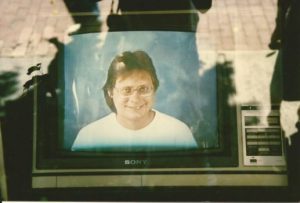
Munich, after the war, September 1919:
“On May 30, 1919, the command over the Military Intelligence Department I b/P was taken over by Captain Karl Mayr. He had served in the General Staff during the war, was intelligent and politically savvy and also a gifted organizer. Prior to his new posting he had been assisting the army guard details and the criminal police of the town as commander of the 6th Battalion of the Munich Watch Regiment.”
On May 30, 1919, the command over the Military Intelligence Department I b/P was taken over by Captain Karl Mayr. He had served in the General Staff during the war, was intelligent and politically savvy and also a gifted organizer. Prior to his new posting he had been assisting the army guard details and the criminal police of the town as commander of the 6th Battalion of the Munich Watch Regiment.”
He began to organize anti-Communist and anti-Semitic propaganda courses in Munich for a selected group of soldiers, who in turn should instruct the returning German army in nationalist propaganda. Corporal Hitler was chosen for the Course 3 B on 10 July through 19 July, 1919. In early July 1919, Mayr’s department I b/P composed its first lists of “propaganda men”, and the list dated July 7 features Adolf Hitler of the 2nd I.R. as number 53. Captain Mayr had met Hitler at Course 3b and was impressed. The group was called the “Enlightenment Detachment”.
In MEIN KAMPF, Hitler claimed: ‘One day I followed an order from superior authority to check out an obviously spurious political association, that under the name “Deutsche Arbeiterpartei” intended to hold a meeting soon, in which Gottfried Feder was to speak as well – I should have a look at the club and report back. … I lived at that time still in a small room at the casern of 2. IR, which still reflected the traces of the revolution. During days I was off, usually at IR 47 or at meetings, giving lessons at other troop details and such. Only at night I slept in my little cell.’
Yet for many reasons, as detailed in the book, the story does not hold up – Mayr sent men regularly out to visit and report on the political scene, and was quite familiar with the DAP.
‘Not only had Mayr during the Räterepublik worked with the Thule Society, in which Karl Harrer, Reichsvorsitzender (Chairman) of the DAP, was a member, his relations to Dietrich Eckart, who had lectured at the Thule Society as well as at DAP functions, were comparably close. In turn, Eckert was in touch with Anton Drexler, who had already – in February 1919 – published articles in the Münchner Beobachter, the paper of the Thule Society, and whom Eckart had seconded during a fierce discussion over the “Jewish Question” in August 1919 in his own paper ‘Auf Gut Deutsch’ (‘In Good German’). Even tighter was the connection between Mayr and Gottfried Feder, who, like Karl Graf von Bothmer, was a member of the inner circle around Dietrich Eckart.’ . . .
‘Yet the fact remains that on September 12, 1919, Adolf Hitler took a tram to the city centre, where the ‘Sterneckerbräu’ was located, the inn where the meeting was to take place. . . . The fact that no less than eight soldiers, all former members of the ‘Enlightenment Detachment’, were among the forty-three people present on September 12 speaks for Mayr’s hand behind the curtain.’
Eights months earlier,on Sunday, January 5, 1919, the abovementioned Anton Drexler and Michael Lotter had founded the “German Workers’ Party” in a room of the Munich tavern “Fürstenfelder Hof”. The protocol of September 12 lists twenty-five party members and eighteen guests present, one of them Adolf Hitler. The scheduled speaker of the day had been Dietrich Eckart, who fell ill, and had to be replaced by Gottfried Feder. Drexler later recalled:
‘Dietrich Eckart fell ill and our meeting had to be postponed. Then Gottfried Feder spoke, and subsequently Professor Baumann, a guest. Baumann was a democrat. … Baumann said that Tyrolia should unite with Bavaria, but not with Germany! To this Hitler responded sharply, and gave a short but intense reply in favour of a Greater Germany, which excited me and all of us so much that I thanked him very much for his contribution and asked him to take home a copy of my pamphlet ‘Mein Politisches Erwachen’, to read it … and, if he agreed with it, to come back in a week and work with us, because we could dearly use people like him.’
‘Famous became Drexler’s line “This Austrian’s got a gob! We need him!” Hitler’s depiction of the evening, characteristically, does not reflect on Feder’s or, for that matter, Baumann’s theories; enraptured, Hitler noted that “… I realized that I could speak!” He claimed that he remembered only two scenes from his visit: that Baumann left the room like a wet poodle and that he still had no big impressions of the party.’
Be that as it may, he joined one week later.
(© John Vincent Palatine 2015/18)
Hits: 212



Leave a Reply